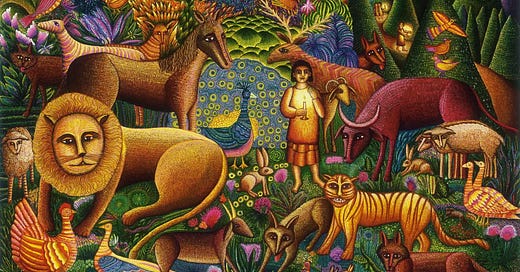Christian animal rights in three passages
The more I learn about the Bible, the more I understand it as a messy text. The Bible was written by many different people at many different times. As a result, it’s filled with conflicting ideologies and values. One can find Biblical justification and condemnation for just about anything. An animal-rights reading might not be the most traditional or natural, but I think it’s absolutely valid.
One can make a Christian case for nonhuman liberation using just three passages from the Bible. Perhaps one could employ fewer, but I prefer answering common objections. The first should establish God desires interspecies peace. The second should establish the need to enact God’s will on Earth. The third should establish Jesus of Nazareth was an imperfect reflection of God’s desires.
There are a number of passages in the Bible that suggest God desires interspecies peace. For instance, the Garden of Eden, presumably God’s ideal, is depicted as a vegan paradise, in which everyone eats plants. However, my favorite is probably in the Book of Isaiah, when God promises a future in which there is no killing, and even carnivorous animals become herbivores.
“The wolf shall live with the lamb,” the New Revised Standard Version Updated Edition says. “The leopard shall lie down with the kid; the calf and the lion will feed together, and a little child shall lead them. The cow and the bear shall graze; their young shall lie down together; and the lion shall eat straw like the ox.” This section describes what’s often referred to as the coming Peaceable Kingdom.
Similarly, there are a lot of passages in the Bible that suggest the need to enact God’s will on Earth. At a certain level, living in accordance with God’s will is the basis of all religions, including Christianity. For my purposes, here, I’m going to use what’s called the Lord’s Prayer, which is how Jesus instructs his followers to pray. It appears in different forms in the Gospels of Matthew and Luke.
“Our Father in heaven, may your name be revered as holy,” Jesus says in the NRSVUE’s Gospel of Matthew. “May your kingdom come. May your will be done, on earth as it is in heaven. Give us today our daily bread. And forgive us our debts, as we also have forgiven our debtors. And do not bring us to the time of trial, but rescue us from the evil one.” The prayer is slightly shorter in the Gospel of Luke.
Finally, there are a number of passages in the Bible which suggest Jesus was an imperfect reflection of God’s desires. For instance, the preacher initially refuses to help a Canaanite woman, because she isn’t Jewish. Acknowledging Jesus’ fallibility is important, because the gospels don’t depict him as vegetarian, let alone vegan. The clearest evidence for this comes when Jesus counsels a rich man.
The episode is described in all the Synoptic Gospels, but let’s draw from the Gospel of Mark now. The rich man asks Jesus how to obtain eternal life, referring to him as a good teacher. Jesus responds this way in NRSVUE: “Why do you call me good? No one is good except God alone.” The best way to understand this, in my opinion, is a Unitarian approach which sees Jesus as imperfect, like all humans.
With just these three passages, or others like them, one can create a compelling, Christian case for animal rights. The description of the Peaceable Kingdom can establish God desires interspecies peace. The Lord’s Prayer can establish the need to enact God’s will on Earth. The episode with the rich man can establish Jesus was an imperfect reflection of God’s will.


